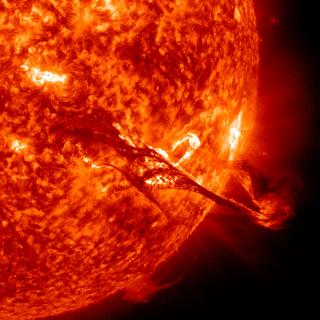Bibcode
Ramírez Vélez, J. C.; Semel, M.; Stift, M.; Martínez-González, M. J.; Petit, P.; Dunstone, N.
Referencia bibliográfica
Astronomy and Astrophysics, Volume 512, id.A6
Fecha de publicación:
3
2010
Revista
Número de citas
15
Número de citas referidas
12
Descripción
Aims: In this paper we study the feasibility of inferring the
magnetic field from polarized multi line spectra using two methods: The
pseudo line approach and The PCA-ZDI approach. Methods: We use
multi line techniques, meaning that all the lines of a stellar spectrum
contribute to obtain a polarization signature. The use of multiple lines
dramatically increases the signal-to-noise-ratio of these polarizations
signatures. Using one technique, the pseudo line approach, we construct
the pseudo line as the mean profile of all the individual lines. The
other technique, the PCA-ZDI approach proposed recently by Semel et al.
(2006, ASPC, 358, 355) for the detection of polarized signals, combines
principle components analysis (PCA) and the Zeeman Doppler imaging
technique (ZDI). This new method has a main advantage: the polarized
signature is extracted using cross correlations between the stellar
spectra and functions containing the polarization properties of each
line. is extracted using cross correlations between the stellar spectra
and functions containing the polarization properties of each line."
These functions are the principal components of a database of synthetic
spectra. The synthesis of the spectra of the database are obtained using
the radiative transfer equations in LTE. The profiles built with the
PCA-ZDI technique are called multi Zeeman signatures. Results:
The construction of the pseudo line as well as the multi Zeeman
signatures is a powerful tool in the study of stellar and solar magnetic
fields. The information of the physical parameters that governs the line
formation is contained in the final polarized profiles. We have shown in
particular using inversion codes that the magnetic field vector can be
properly inferred with both approaches despite the magnetic field
regime.
Proyectos relacionados

Magnestismo Solar y Estelar
Los campos magnéticos son uno de los ingredientes fundamentales en la formación de estrellas y su evolución. En el nacimiento de una estrella, los campos magnéticos llegan a frenar su rotación durante el colapso de la nube molecular, y en el fin de la vida de una estrella, el magnetismo puede ser clave en la forma en la que se pierden las capas
Carlos Cristo
Quintero Noda